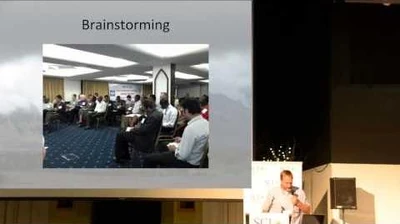Paul Hedrick (talk | contribs) m (→Contact) |
Tom Sponheim (talk | contribs) m (→Contact) Tag: sourceedit |
||
| (13 intermediate revisions by 4 users not shown) | |||
| Line 1: | Line 1: | ||
{{GoogleTranslateLinks}} |
{{GoogleTranslateLinks}} |
||
| ⚫ | |||
| ⚫ | [[File:Funk 1.jpg|thumb|right|250px|Paul Funk at the Solar Cookers International Network Convention in July, 2014.]][[Paul Funk]] began to appreciate the importance of cook fire alternatives when he saw women in [[Tanzania]] spending 20 hours a week collecting [[Fuelwood|firewood]]. The experience compelled him to change his master's thesis topic at the University of Minnesota to solar cooking. He continued solar cooking research for his doctorate in Agricultural Engineering at the University of Arizona, where there was more sunshine. His dissertation work eventually led to the development of an international standard “Testing and Reporting Solar Cooker Performance,” published by ASAE. |
||
| ⚫ | |||
| − | [[File:Paul_Funk_profile_photo,_2-6-14.jpg|right|150px]] |
||
| ⚫ | [[Paul Funk]] began to appreciate the importance of cook fire alternatives when he saw women in [[Tanzania]] spending 20 hours a week collecting [[Fuelwood|firewood]]. The experience compelled him to change his master's thesis topic at the University of Minnesota to solar cooking. He continued solar cooking research for his doctorate in Agricultural Engineering at the University of Arizona, where there was more sunshine. His dissertation work eventually led to the development of an international standard “Testing and Reporting Solar Cooker Performance,” published by ASAE. |
||
The test standard allows people to test all three types of solar cookers – [[parabolic solar cooker| parabolic]], [[solar box cooker|box]] and [[Panel-style solar cookers|panel]] types – with inexpensive tools in remote locations. Paul spent three months in a rural village living in a mud hut with a grass roof, so he appreciates that test conditions may not be supported with urban infrastructure or utilities. The test standard can be found at [[Media:ASAE_informal_Testing_and_Reporting_Solar_Cooker_Performance.pdf|ASAE information on Testing and Reporting Solar Cooker Performance]]. |
The test standard allows people to test all three types of solar cookers – [[parabolic solar cooker| parabolic]], [[solar box cooker|box]] and [[Panel-style solar cookers|panel]] types – with inexpensive tools in remote locations. Paul spent three months in a rural village living in a mud hut with a grass roof, so he appreciates that test conditions may not be supported with urban infrastructure or utilities. The test standard can be found at [[Media:ASAE_informal_Testing_and_Reporting_Solar_Cooker_Performance.pdf|ASAE information on Testing and Reporting Solar Cooker Performance]]. |
||
| Line 16: | Line 15: | ||
In support of his research, he has served solar cooked food to his children and various dinner guests, and so far no casualties! |
In support of his research, he has served solar cooked food to his children and various dinner guests, and so far no casualties! |
||
| ⚫ | |||
| ⚫ | |||
| ⚫ | *'''December 2013: Technical testing standards for solar cookers updated''' - The American Society of Agricultural and Biological Engineers (ASABE), based in St. Joseph, {{state|Michigan}}, [[USA]], has revised its [[Testing|solar cooker testing]] standard. The organization is recognized worldwide for developing voluntary standards for food, agricultural, and biological systems. Often sited in technical reviews, the updated version, written by [[Paul Funk]], will replace the current standards established ten years ago. The goal is to promote uniformity and consistency in the terms and units used to describe, test, rate, and evaluate solar cookers, solar cooker components, and solar cooker operation. However, it is outside of the scope of the standards to factor in cost, durability, and user satisfaction. Review the new standards: [[Media:ASAE_informal_Testing_and_Reporting_Solar_Cooker_Performance.pdf|ASAE information on Testing and Reporting Solar Cooker Performance]] |
||
| + | ==Audio and video== |
||
| + | *'''August 2015:''' |
||
| + | ::[[File:Funk Solar Cooking in the Classroom|none|400 px]] |
||
| + | *'''July 2014:''' |
||
| ⚫ | |||
| + | ::[[File:Funk- ASAE 581 Standards- updates|thumb|none|400px]] |
||
| + | *'''July 2014:''' |
||
| ⚫ | |||
| + | ::[[File:Funk Solar Cookers Worldwide|thumb|none|400 px]] |
||
| ⚫ | *'''December 2013:Technical testing standards for solar cookers updated''' - The American Society of Agricultural and Biological Engineers (ASABE), based in St. Joseph, {{state|Michigan}}, [[USA]], has revised its [[Testing|solar cooker testing]] standard. The organization is recognized worldwide for developing voluntary standards for food, agricultural, and biological systems. Often sited in technical reviews, the updated version, written by [[Paul Funk]], will replace the current standards established ten years ago. The goal is to promote uniformity and consistency in the terms and units used to describe, test, rate, and evaluate solar cookers, solar cooker components, and solar cooker operation. However, it is outside of the scope of the standards to factor in cost, durability, and user satisfaction. Review the new standards: [[Media:ASAE_informal_Testing_and_Reporting_Solar_Cooker_Performance.pdf|ASAE information on Testing and Reporting Solar Cooker Performance]] |
||
| + | |||
| + | *'''July 2014:''' |
||
| + | ::[[File:Funk ISO TAG Solar cookers and safety standards for cookstoves|thumb|none|400 px]] |
||
==See also== |
==See also== |
||
| Line 31: | Line 40: | ||
==Reports== |
==Reports== |
||
*'''August 1999:''' [[Media:Solar_Cooker_Test.pdf|Evaluating the International Standard Procedure for Testing Solar Cookers and Reporting Performance]] - ''Paul Funk'' |
*'''August 1999:''' [[Media:Solar_Cooker_Test.pdf|Evaluating the International Standard Procedure for Testing Solar Cookers and Reporting Performance]] - ''Paul Funk'' |
||
| + | |||
| + | *{{NewMar16}}'''June 1991:'''[[Media:Project_Report_Tanzania_1991_-_Paul_Funk.pdf|Project Report Tanzania]] - ''[[Paul Funk]]'' |
||
==External links== |
==External links== |
||
| Line 40: | Line 51: | ||
[[USA]] |
[[USA]] |
||
| − | Tel.: +1 575 526 |
+ | Tel.: +1 (575) 526-6381<br> |
Email: [mailto:pfunk@nmsu.edu pfunk@nmsu.edu] |
Email: [mailto:pfunk@nmsu.edu pfunk@nmsu.edu] |
||
[[Category:Solar Cookers International Network members|Funk]] |
[[Category:Solar Cookers International Network members|Funk]] |
||
| Line 46: | Line 57: | ||
[[Category:Tanzania|Funk]] |
[[Category:Tanzania|Funk]] |
||
[[Category:USA|Funk]] |
[[Category:USA|Funk]] |
||
| + | [[Category:Verified active 2016|Funk]] |
||
Revision as of 01:35, 16 March 2016
|
Last edited: 15 March 2016
|
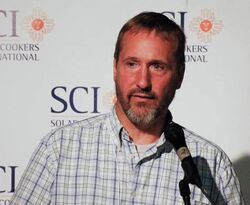
Paul Funk at the Solar Cookers International Network Convention in July, 2014.
Paul Funk began to appreciate the importance of cook fire alternatives when he saw women in Tanzania spending 20 hours a week collecting firewood. The experience compelled him to change his master's thesis topic at the University of Minnesota to solar cooking. He continued solar cooking research for his doctorate in Agricultural Engineering at the University of Arizona, where there was more sunshine. His dissertation work eventually led to the development of an international standard “Testing and Reporting Solar Cooker Performance,” published by ASAE.
The test standard allows people to test all three types of solar cookers – parabolic, box and panel types – with inexpensive tools in remote locations. Paul spent three months in a rural village living in a mud hut with a grass roof, so he appreciates that test conditions may not be supported with urban infrastructure or utilities. The test standard can be found at ASAE information on Testing and Reporting Solar Cooker Performance.
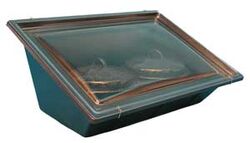
The SOS Sport solar oven
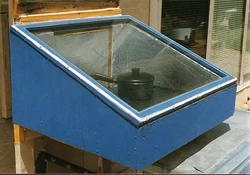
A version of Paul Funk's Solar wall oven from the outside
Paul also has designed solar cookers. One, the SOS Sport, is currently in mass production with over 25,000 units sold by the Solar Oven Society. Another design, the Solar Wall Oven, is for do-it-yourself folks and uses internal reflectors to make solar cooking accessible from an indoor kitchen.
As well as the test standard, he has published two peer reviewed journal articles on solar cooking, and has presented papers on solar cooking at seven international conferences.
Paul served on the board of directors of Solar Cookers International from 2000-2002.
In support of his research, he has served solar cooked food to his children and various dinner guests, and so far no casualties!
Recent news and developments
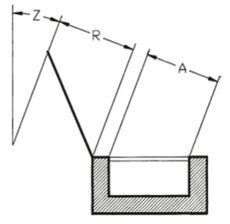
Determining the solar intercept area, ASABE S580.1
- December 2013: Technical testing standards for solar cookers updated - The American Society of Agricultural and Biological Engineers (ASABE), based in St. Joseph, Michigan, USA, has revised its solar cooker testing standard. The organization is recognized worldwide for developing voluntary standards for food, agricultural, and biological systems. Often sited in technical reviews, the updated version, written by Paul Funk, will replace the current standards established ten years ago. The goal is to promote uniformity and consistency in the terms and units used to describe, test, rate, and evaluate solar cookers, solar cooker components, and solar cooker operation. However, it is outside of the scope of the standards to factor in cost, durability, and user satisfaction. Review the new standards: ASAE information on Testing and Reporting Solar Cooker Performance
Audio and video
- August 2015:
- July 2014:
- July 2014:
- July 2014:
See also
Reports
- August 1999: Evaluating the International Standard Procedure for Testing Solar Cookers and Reporting Performance - Paul Funk
- June 1991:Project Report Tanzania - Paul Funk
External links
Contact
Paul Funk
PO Box 578
Mesilla Park, New Mexico, 88047
USA
Tel.: +1 (575) 526-6381
Email: pfunk@nmsu.edu




